Rachel Held Evans's Blog, page 6
August 10, 2015
Big News for the Evans Family...(and a chance for you to celebrate with us!)
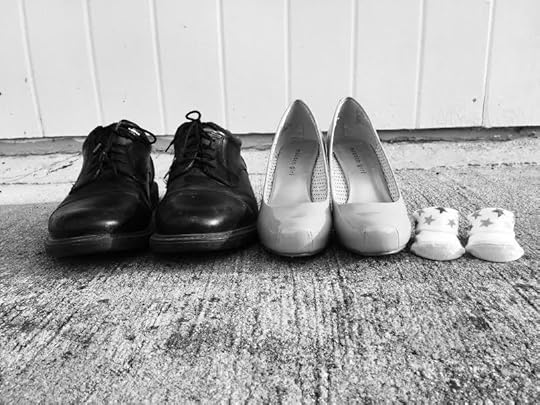
“Congratulations! You’re six weeks pregnant and your baby is the size of lentil bean!”
And so began the veritable cavalcade of fruits, berries, and legumes the pregnancy industry has selected as apt representations of the little life growing inside of me.
Blueberry. Kidney Bean. Brussel Sprout. Kumquat.
….Only with a beating heart, growing brain, and more love willing it onward that I ever thought possible.
The lentil bean stage was eight weeks ago. Dan and I got a second glimpse of our now lemon-sized addition in an ultrasound last week, and just like last time, he or she was kicking up a storm.
“Very active!” said the OB.
So now we spend our afternoons giggling and groaning and dreaming about what “very active” might mean - a boy? a ballerina? a crier? an adventurer? a swimmer? an early bird like Dad? a little hellion we’ll have to chase around the house?
It’s the unknown that makes a pregnancy exciting, and it’s the unknown that makes it so scary too.
In addition to the expected nausea and fatigue (...my goodness, the fatigue...), I’ve been hit with a potent dose of fear. Dan and I privately grieved a miscarriage last year, so these last 13 weeks have tested my nerves and my faith like never before, with every subtle shift in symptoms, every little twist of abdominal pain, triggering a reel of worst-case-scenarios in my mind.
In the midst of this hormone-infused miasma, I’ve found myself drawn to familiar yet forgotten lines from Scripture:
“The days were accomplished that she should be delivered…”
What worlds are hidden in those nine words!
And so, like millions of women before me and millions of women after, I’m practicing the spiritual discipline of taking it a day at a time.
Each day is a gift. Each day is an accomplishment. I cannot imagine, much less control, the future. But I can do the next thing...even if the next thing is to give up and take a nap.
Where You Come In...As nervous as I’ve been, I’ve also been grateful.
I’m grateful for access to quality prenatal care. I’m grateful for ultrasounds and breastfeeding classes and competent OBGYNs. I’m grateful for a state-of-the-art NICU unit a stonesthrow away from my delivery room. I’m grateful for a supportive husband and family nearby.
I’m grateful that, unlike the women I met in rural Bolivia, I won’t have to walk fifteen miles to an under-equipped clinic to deliver my baby. I’m grateful for the freedom I have to eat well, to prepare, to space out future pregnancies in a healthy way, and to make good decisions for our family.
But these are not blessings to take for granted. Every year, nearly 300,000 women in developing nations die from preventable complications during childbirth, and 6.3 million children die before their fifth birthday each year. Far too many mamas will bury their babies before they even get to know the sound of their laughter or the tenor of their cries. And far too many will suffer debilitating injuries or even death due to dire but preventable circumstances.
(To get a sense of the need, follow this journal from an OBGYN serving in Sierra Leone.)
The thing is, we know how to turn these numbers around: better education, access to contraception, and improved and affordable prenatal and infant care.
Melinda Gates, a passionate advocate for improved maternal and infant care worldwide, puts it this way: “To help women and children fulfill their potential, we need to make sure they can receive the right kind of health care at every phase of their lives. Each aspect of reproductive, maternal, newborn, and child health connects to the next.”
(See Melinda Gates’ TED Talk on the role of contraception in curbing maternal and infant mortality as well as abortion.)
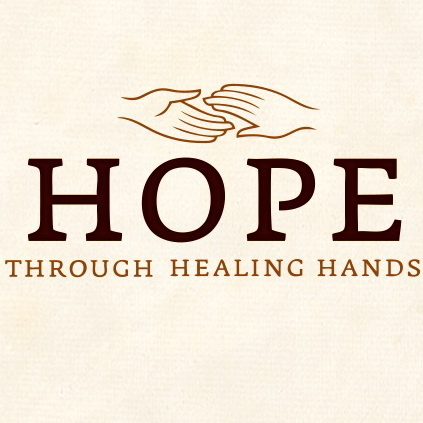
So, in honor of the new addition to Team Evans, I’m joining Melinda Gates, Amy Grant, Michael W. Smith, Kay Warren, Desmond Tutu, Jimmy Carter and host of other Christian advocates in their support of an organization called Hope Through Healing Hands, and in particular the Faith Based Coalition for Healthy Mothers and Children Worldwide, which seeks to galvanize faith-based leaders and their constituencies around the issues of maternal, newborn, and child health (MNCH) as well as healthy timing and spacing of pregnancies (HTSP) to improve maternal health and reduce child mortality around the world. (Note: Hope Through Healing Hands does not fund abortion. Learn more here.)
Dan and I will be blessed with plenty of gifts, plenty of diapers and onesies and gear (...my goodness, all the gear!)... So if you want to offer a special congratulations on our big news, jump over to my fundraising page to leave a message and a gift in support of Hope Through Healing Hands.
Every woman deserves the chance to see the days accomplished that she should be delivered.
Every woman deserve the chance to watch her children grow up.
May our good news lead to more good news for mamas around the world.
Donate Now(Note: Another option for supporting Hope Through Healing Hands is to pick up a copy of The Mother & Child Project: Raising Our Voices for Health and Hope (2015), to which I contributed a chapter!)



July 15, 2015
For the sake of the gospel, drop the persecution complex
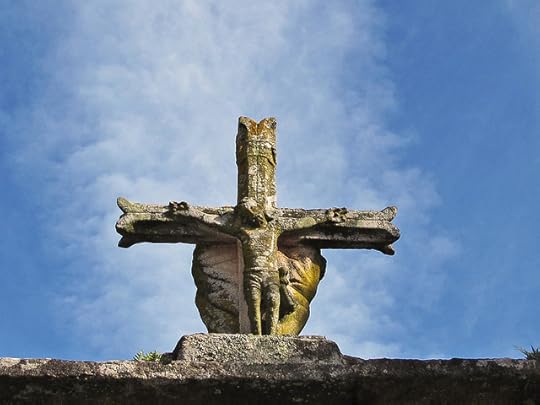
© 2011 jacinta lluch valero, Flickr | CC-BY-SA | via Wylio
Did you hear about the pastor who was arrested for not marrying a same-sex couple? What about the publisher that got sued for refusing to censor anti-gay verses from the Bible?
Both of these stories have been exposed as fakes of course, but that didn’t keep hundreds of thousands of conservative Christians from sharing them online this week. When I pointed out to a friend that the story he had just shared on social media wasn’t true, he replied, “well it might as well be. Christians in this country are under attack.”
It has become a familiar refrain. We hear it every Christmas when an unsuspecting store clerk wishes the wrong Christian “happy holidays” instead of “Merry Christmas.” We hear it whenever a high school drops its traditional pre-football game prayer out of respect for those students who may be Jewish or Muslim or non-religious. An entire industry of books and films has blossomed in the red soil of the American Christian persecution complex, with the first “Gods’ Not Dead” installment caricaturing and vilifying atheists and the second set to expose liberal efforts to “expel God from the classroom once and for all.”
Now, most of the time, this phenomenon falls into the frustrating but relatively harmless category of culture war posturing, but lately, as the apocalyptic, fear-based rhetoric continues to ratchet up in the wake of the Supreme Court’s decision regarding same-sex marriage, and as that rhetoric continues to target and demonizes LGBT people, it’s been doing some real harm. Just last week I received at least a dozen messages from friends and readers who told me the response from Christians to the Supreme Court ruling confirmed for them what they’ve known in their hearts for a while: they don’t want anything to do with Christianity anymore, not if this is what it’s all about.
So what I’d like to suggest to my fellow Christians is that perhaps taking up the cross means laying down the persecution complex. A spirit of fear and entitlement does more to obscure the gospel than elucidate it. Here are some reasons why:
The persecution complex is not based in reality.Not only do American Christians experience complete religious freedom in this country, we also enjoy tremendous privilege. More than seventy-percent of the population identifies as Christian, as do the majority of our representatives to congress and every single U.S. president. Our churches, whose steeples dot every cityscape and small town in the land, are exempt from paying taxes, and unlike many people of other faiths, we don’t have to worry about fighting with our employers to take time off to celebrate our religious holidays as they are largely taken for granted.
In spite of all this, many Christians like to imagine themselves as the scrappy underdogs, bullied and oppressed for their faith yet bravely standing for their beliefs. Former pastor Mark Driscoll made news a few years ago by accusing the Orange County City Council of religious discrimination for not allowing him to convert a building in the area into a church. It was later revealed he knew from the beginning the building wasn’t zoned for a church but was using the American Christian persecution complex to try and garner support for bending the rules.
Neil Carter, who was actually fired from his teaching job for being an atheist, suggest that Christians create fictions like these because “real life does not sufficiently validate people’s persecution complexes.”
“[Christians] are manufacturing conflicts in order to have something to rally behind,” he writes. “It makes them feel more in touch with the early Church’s tumultuous beginnings. But it takes a lot of smoke in mirrors to make it look like the people with the most privilege in a region (like Christians in the Bible Belt) are being mistreated by the people who run things. Where I live, all the judges, jurors, and attorneys are devout Christians. So are the teachers, the principal, and almost all of the parents.”
The persecution complex blinds Christians to our own privilege, which then blinds us to the challenges faced by the genuinely underprivileged in this country. We get so focused on ourselves and our own concerns we forget the admonition of the apostle Paul to “not merely look out for your own personal interests, but also for the interests of others (Phillippians 2:4)”
And if you think the SCOTUS ruling did anything to alter this privilege, a few reality checkers are in order:
Reality Check #1: No one lost any rights in the Supreme Court decision. What happened was a minority group that had previously been denied a civil right the rest of us take for granted was given access to that right. Sharing civil rights with other people is not the same as being persecuted by them. In fact, I see the decision as a victory for religious freedom in the sense that people whose religion supports and encourages same-sex unions will no longer be prohibited from practicing that important religious value simply because some of their neighbors hold a different view. I have yet to see a shred of evidence to suggest that the presence of a marriage license in the home a gay couple has any power to negatively affect the marriage of the straight couple down the street.
Reality Check #2: Contrary to what you may have read on Facebook, pastors and priests will not be forced to marry same-sex couples or be fined for refusing to…just as they are not presently forced to marry interfaith couples if their tradition opposes it, or cohabitating couples if their tradition opposes it, or divorcees if their tradition opposes it, or interracial couple if their tradition opposes it. That religious freedom has, and very likely will, be preserved. Just take interracial marriage, for example. It’s been 48 years since the Supreme Court ruled that the laws in sixteen states prohibiting interracial marriage were unconstitutional. At the time, only about 25% of the American public supported interracial marriage, with many citing religious reasons for opposing it. While public opinion has (thankfully) changed, the right of a clergy member to refuse to marry an interracial couple hasn’t. Just as a pastor can still refuse to marry an interracial couple, he can still refuse to marry a same-sex couple without fear of government intervention. There is no indication whatsoever this will change.
Reality Check #3: Facing disagreement is not the same as facing persecution. Conservative Christians are right about one thing: public opinion has shifted on same-sex marriage (particularly within the Church), and this means they are more likely to encounter pushback when they insist same-sex marriage ought to be illegal. Facebook friends may argue with them. Comedians may satirize them. Bloggers may write posts like these disagreeing with them. But to conflate such disagreement with the sort of persecution Jesus warned his disciples about is not only myopic, but also a slap in the face to those Christians who face very real persecution around the world. Living in a pluralistic society that also grants freedom and civil rights protection to those with whom one disagrees is not the same as religious persecution. And crying persecution every time one doesn’t get one’s way is an insult to the very real religious persecution happening in the world today. It's no way to be a good citizen and certainly no way to advance the gospel in the world.
Which brings me to my second point...
The persecution complex minimizes the very real suffering of others.If Dan and I walk the streets of downtown Dayton, Tennessee holding hands, it will not even occur to us to fear for our safety or worry about harassment because of it. I’m afraid the same cannot be said for a gay couple engaging in the same activity. (It should be noted that in 2004, our county commission attempted to criminalize homosexuality.) That’s because in spite of shifting views on same-sex marriage, gay, lesbian, bisexual, and transgender people continue to face incredible hostility here in the U.S. and around the world, often at the hands of Christians.
Here in the U.S., homeless and suicide rates among LGBT youth remain shockingly high, in part because conservative Christian leaders like John McArthur instruct parents of gay children to “hand them over to Satan” and refuse to associate with them. Half of gay males experience a negative reaction from parents when they come out, and in 26% of those cases, the gay child is thrown out of the home. Studies suggest that between 25% and 50% of homeless youth are on the street because of their sexual orientation or gender identity. Those whose families reject them are more than eight times more likely to attempt suicide than those whose families support them.
In most states, people can still be fired from their (secular) jobs just for being gay, or thrown out of their homes if their landlord doesn’t like LGBT people. Many LGBT people recall getting bullied mercilessly in school, and I’ve heard from several who report that they learned their first ant-gay slur from their church youth group.
For years, conservative Christians pushed for so-called reparative therapy efforts to change people’s sexual orientation from homosexual to heterosexual, which proved so traumatizing and dangerous to LGBT people and their parents that even the head of the most popular “ex-gay” organization, Exodus International, apologized for the damage done by those efforts and shut the organization down.
Christian leaders have blamed gay and lesbian people for the attacks on 9-11, Hurricane Katrina, and all sorts of natural and man-made disasters. The myth that gay and lesbian people are child molesters often goes unchallenged when spread from the pulpit, and in the 80s and 90s, many Christians refused to support efforts to curb the HIV/AIDS crisis as they believed it to be a “curse from God” that gay people deserved. (See Chapter 5 of Forgive Us: Confessions of a Compromised Faith).
Among Gospel Coalition leaders alone, it has been suggested recently that LGBT people are so disgusting they ought to induce a gag reflex, that there is “no such thing as a gay Christian,” and that supporting same-sex marriage is worse than supporting slavery. I have several friends who were so traumatized by their experiences with Christians they cannot even walk through the doors of a church without suffering a physical reaction similar to PTSD—uncontrolled shaking, sweating, and panic. And I have cried with parents of LGBT kids who were stripped of membership in their beloved churches simply because they wouldn’t publicly denounce their children.
And this is just what LGBT people face here in the U.S. Influenced by evangelical missionaries to the continent, many African nations have adopted legislation in which people can be thrown in jail or executed for being gay. (Just this week, John Piper tweeted his support of Kenya’s criminalization of homosexuality.) There are 79 countries in which homosexuality is illegal and many more in which LGBT people are advised not to travel because they may be violently threatened and harassed.
When it comes to opposition to gay rights, conservative Christians have been on the front lines, opposing measures that would give people in same-sex relationships the right to visit their partners in the hospital, file taxes jointly, adopt children, share insurance, and rent apartments without fear of unjust eviction. Routinely fundamentalist Christians compare people in same-sex relationships to pedophiles and demand an explanation for how their most important relationships are any different than people having sex with dogs. Anti-gay bullying, discrimination, and hate-speech often go unchallenged by Christians, and are far too often perpetuated by them.
So when Kevin DeYoung laments at the Gospel Coalition that Christians who opposed same-sex marriage are “worried about social ostracism and cultural marginalization” and asks that supporters of LGBT equality stick up for Christians when “their jobs, their reputations, and their freedoms are threatened,” it’s hard to blame anyone for balking with righteous incredulity.
Where is the concern for gay kids getting kicked out of their homes to live on the streets? Where is the opposition to LGBT bullying and housing discrimination? Why remain silent when Christian leaders speak in crude and hateful terms about LGBT people or support the criminalization of homosexuality overseas?
What the persecution complex suggests is that conservative Christians only care about bullying, oppression, and discrimination when it happens to them. If it happens to LGBT people, or to people in other religious minority groups, it is of little concern (or is tacitly supported). Compassion and advocacy are rooted in self-interest alone and Christian privilege is guarded ruthlessly, even if it comes at the expense of others.
Furthermore, when Christian leaders like Franklin Graham predict God’s impending judgment on the U.S. in the wake of the Supreme Court decision, arguing “our country’s foundations are being destroyed,” it suggests that slavery, genocide, extreme gender inequity, and Jim Crow weren’t serious enough to warrant a response from God, but now that our gay neighbors can get marriage licenses, all hell is sure to break lose. This reveals a profound ignorance regarding the suffering of other minority groups, both historically and presently. When white conservative Christians obsess over their own perceived oppression, it becomes incredibly difficult to engage in important conversations about religious, racial, and gender privilege that are necessary for creating a more just society. How can we begin to recognize our own privilege and the harm it can cause when it remains unchecked if we believe ourselves to be an oppressed minority?
The discomfort of conservative Christians whose views on gender and sexuality are being challenged more than they once were is nothing compared to the suffering faced by LGBT people and religious and ethnic minorities in this country. We would all do well to remember that.
The persecution complex vilifies LGBT people and ignores intersecting identities.In addition to minimizing the suffering of LGBT people and other minority groups, the persecution complex caricatures them as evil villains out to destroy Christians, which is a tried and true way of making an already-marginalized group appear more powerful than they actually are in order to turn public opinion against them. When Christian leaders blame LGBT people for natural disasters or warn they are going to “come after” Christians, it’s hard not to be reminded of what was often said about Jews in Europe to justify centuries of prejudice against them. This sort of rhetoric dehumanizes our neighbors and prevents us from loving them well.
There is an inconsistency, too, in the justification of discrimination against LGBT people that points to a special animus against them. County clerks who cite their Christian values when refusing to issue marriage licenses to same-sex couples don’t also refuse licenses to cohabitating couples, or divorcees, or interfaith couples (also frowned upon in conservative Christian circles), nor do the bakers and restaurant owners who refuse to serve LGBT people refuse to serve other perceived “sinners.”
And perhaps most importantly, the “gays vs. Christians” narrative ignores the fact that 48 percent of gay Americans identify as Christians. The majority of my gay, lesbian, bisexual, and transgender friends are devoted followers of Jesus whose faith in the midst of near-constant attack puts my own faith to shame. Obviously, LGBT people aren’t interested in persecuting themselves! But framing this as a culture war between Christians and LGBT people suggests that they have to choose and further marginalizes LGBT Christians by denying them their very identity. It says, “you say you’re a Christian, but you really aren’t,” which, if you’ve ever had that accusation thrown your way, you know is incredibly condescending and painful.
In a wise and grace-filled post entitled, “We’re Not Out to Get You,” Andrew Holubeck writes:
“[Most LGBT people] are not actually out to take away anyone’s freedom to worship, preach, and teach as they please. I know it’s rather convenient and comforting to believe that we are, to see us as ‘the bad guys’ out to destroy you, because then you don’t have to deal with the messy idea that good people can still significantly disagree on very important issues. We certainly do the same thing to you all, and for the same reasons. But I think it would do us all a world of good if both sides worked harder to resist the temptation to vilify the other.”
(Note: You may be thinking to yourself, “what about the bakers who were fined for refusing to make a cake for a same-sex couple?” That single story has already been so exaggerated and exploited by folks on both sides I’d rather not take the space in the post to address it, but may do so in a comment or separate post.)
The persecution complex obscures the gospel of Jesus Christ.You know who was actually persecuted for their religious beliefs?
Jews under Roman occupation in the first century.
And you know what Jesus told those Jews to do?
Pay your taxes. Give to those who ask. Do not turn people away. Love your neighbors. Love even your enemies.
When Jesus spoke of “walking the second mile,” he was referring to an oppressive Roman law that allowed a traveling Roman solider to demand that a stranger carry his pack for up to one mile. No doubt some of Jesus’ first listeners had been forced to do just that, to drop their farming equipment, fishing nets, or carpentry tools and carry a heavy pack, losing hours of work in the process. The law allowed the soldier to demand from them a mile, no more. Jesus told his followers to walk two.
“If anyone slaps you on the right cheek, turn to them the other cheek also,” he said. “And if anyone wants to sue you and take your shirt, hand over your coat as well. If anyone forces you to go one mile, go with them two miles. Give to the one who asks you, and do not turn away from the one who wants to borrow from you… Love your enemies and pray for those who persecute you, that you may be children of your Father in heaven... If you love those who love you, what reward will you get? Are not even the tax collectors doing that? And if you greet only your own people, what are you doing more than others? Do not even pagans do that? Be perfect, therefore, as your heavenly Father is perfect."
As Christians, our most “deeply held religious belief” is that Jesus Christ died on the cross for sinful people, and that in imitation of that, we are called to love God, to love our neighbors, and to love even our enemies to the point of death. And yet right now, the prevailing perception of American Christians is that baking a cake for a gay couple is too much to ask.
As I’ve made it clear in the past, I support marriage equality and affirm my gay and lesbian friends who want to commit themselves to another person for life. But over and beyond my beliefs regarding homosexuality is my most deeply-held conviction that I am called to love my neighbor as myself…even if it costs me something, even if it means walking a second mile. And I know many of my fellow Christians who hold a more conservative view of sexuality share that conviction too.
I've been watching people with golden crosses around their necks and on their lapels shout at the TV about how serving gay and lesbian people is a violation of their “sincerely-held religious beliefs.” And I can't help but laugh at the sad irony of it. Two-thousand years ago, Jesus hung from that cross, looked out on the people who put him there and said, "Father, forgive them." Jesus served sinners all the way to the cross.
If conservative Christians continue to treat LGBT people as second-class citizens and to cry persecution every time they don’t get their way, they will lose far more than the culture wars. They will lose the Christian identity. We’ve obscured the gospel when the “right to refuse” service has become a more widely-known Christian value than the impulse to give it.
Lord, have mercy on us and show us a new way.



June 26, 2015
Repenting of 'Colorblindness'
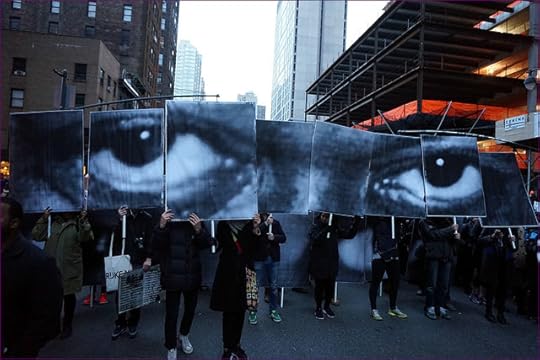
© 2014 The All-Nite Images, Flickr | CC-BY-SA | via Wylio
“They dress the wound of my people
as though it were not serious.
‘Peace, peace,’ they say,
when there is no peace…
They have no shame at all; they do not even know how to blush.”
- Jeremiah 6:14
In her groundbreaking book, The New Jim Crow: Mass Incarceration in the Age of Colorblindness, Michelle Alexander notes that “racial caste systems do not require racial hostility or overt bigotry to thrive. They need only racial indifference…” Or, as Martin Luther King put it, they need only “sincere ignorance and conscientious stupidity.”
I ran headlong into my own “sincere ignorance and conscientious stupidity” just two weeks ago when I gave a lecture for a writers conference at Princeton Theological Seminary and in reference to Jesus’ parable of the vineyard workers, described God as a “generous master” whom we serve with our faithful work. Afterwards, a black woman approached me and with far more grace than I deserved, reminded me that to African American listeners like her the image of God as a cosmic master is not only discomforting but frightening and oppressive.
It seemed so obvious the moment she said it, but in all my preparation, it simply hadn’t occurred to me to reconsider my phraseology because privilege had rendered the word “master” neutral in my mind. (After all, the landowner in that parable had paid his workers, right?) Had I been more aware of how people of color view the world, had I spent just a little more time listening well and considering context, I would have known better and avoided a hurtful error.
In this case, and in so many other cases, the problem isn’t that I hate black people. I don’t. The problem is that being white in America means I get to be oblivious. I get to be ignorant. I get to be “colorblind” when it suits me, and that luxury is exactly what keeps me and so many other well-intentioned white people from doing more to confront, repent of, and combat white supremacy and racial injustice in America.
See, many of us have spent years believing that we combat gender inequity by raising awareness and calling it out, we combat human trafficking by raising awareness and calling it out, we combat corruption by raising awareness and calling it out, and we combat racism by not breathing a word. The goal with race, we’ve been taught, is to “not see color,” to treat everyone exactly the same, to avoid the topic altogether like it’s the imaginary lava in a children’s game.
But as Alexander puts it, “the colorblind public consensus that prevails in America today—i.e,. the widespread belief that race no longer matters—has blinded us to the realities of race in our society and facilitated the emergence of a new caste system… Seeing race is not the problem. Refusing to care for the people we see is the problem. We should hope not for a colorblind society but instead for a world in which we can see each other fully, learn from each other, and do what we can to respond to each other with love.”
It think it’s this misguided notion of “colorblindness” (which isn’t even supported by science) that leads people to say things like:
“Why do they [people of color] have to make this about race? They’re being oversensitive.”
“This murder/ excessive force/mass shooting/act of discrimination/imprisonment was an isolated incident and not indicative of a larger cultural problem. We need to get all the facts before we start talking about race.”
“I’m not a racist. I don’t even see color.”
“The Confederate flag is about heritage, not hate.”
“We need to return to the days when America was a Christian nation.”
Like my reference to God as “master,” such statements don’t necessarily arise out of overt hostility or hate (though of course sometimes they do), but rather out of ignorance regarding the historical and cultural context from which recent race-related events have emerged. It’s a failure to connect the Charleston shooting with the hundreds of other church fires and bombings that have terrorized black churchgoers for centuries, or the violent breakup of a pool party by police with memories of segregated pools, gunned-down teenagers, and brutalization against black women. It’s thinking the deaths of Trayvon Martin, Eric Garner, and Freddie Gray are just “isolated incidents” when every statistic and study under the sun suggests the justice system is rigged against black men. It’s the notion that black people have “made this about race” when it was white people who, convinced their own race was superior, captured, enslaved, raped, lynched, and discriminated against an entire group of people because of the color of their skin.
This selective “colorblindness” is a mighty convenient approach to race in America for white people, for it allows us to paper over America’s troubled (and decidedly anti-Christian) history, to discount racism as a thing of the past for which we are no longer responsible, and to ignore persistent racial injustices like mass incarceration, police brutality, voting rights issues, white flight, and economic inequality, all while consistently benefiting from an oppressive system we claim we cannot even see. “Colorblindness” means I can attend a Christian conference with all white speakers and not even notice or consider that a problem. It means I can be shocked by appropriate use of the n-word because it’s never been inappropriately directed at me. It means my default is to consider police heroes because, unlike my black friends, I don’t get pulled over at least once or twice a year. It means I can describe God as my master without even flinching.
Meanwhile, “colorblindness” is a luxury people of color in America simply cannot afford. Black mamas don’t get to opt out of seeing color, for example, when they sit their ten-year-olds down for “the talk” about how to avoid getting shot by police. Our black and native American brothers and sisters don’t get to join white pastors and politicians in uncritically celebrating America’s “Christian heritage” when that heritage meant rape, enslavement, genocide, lynching, and discrimination against their families. Theologians of color don’t benefit from “colorblindness” when their perspectives are discounted as “contextual” while those of white, Western theologians are considered the objective default.
“Colorblindness,” rather than being a goal for which to aim, ought to be a sin from which to repent. God doesn’t want us to close our eyes to injustice. We are not called to be neutral. God wants us to see—even if it makes us uncomfortable, even if we’re not exactly sure what to do. Yes, the Apostle Paul spoke about how there is “neither male nor female, slave nor free, Jew nor Gentile” in the family of God, but he was also quick to acknowledge those same categories when he saw one group oppressing the other. Listening to, believing, and standing in solidarity with those who are crying out in pain strengthens Christian unity not weakens it.
Sometimes it takes a while (and a few mistakes) to shift from a posture of avoidance to a posture of engagement. I’m still learning, still growing, still screwing-up. It would be nice to have a list of 10 Things to Do to Achieve Racial Justice This Month, but no such list exists. Instead, I suspect meaningful change begins with a total reorientation, and total reorientation requires a bit of homework.
In my own experience, I’ve found that a big part of what I was missing in understanding and engaging issues around racial justice was context—historical context, experiential context, and theological context. So here are some resources that have helped me in recent years:
For Historical ContextThe Civil War as Theological Crisis by Mark Noll: This book is a stunning eye-opener that details the religious-based arguments for and against slavery in the buildup to the U.S. Civil War. More than half of all defenses of slavery were written by pastors who cited Scripture to make their case, and Noll immerses the reader in primary sources to unpack and understand those defenses as well as the counter-arguments made by abolitionists. It’s an important read because a lot of Christians like to imagine that people of faith were on the “righteous side” of history on this, but the fact is, Christians were split. We must familiarize ourselves with the nature of these debates lest we whitewash Christian history or, worse, commit the same injustices again. Thankfully, Noll’s writing is lively and engaging, so wading through these arguments proves a sobering but easy task.
The Cross and the Lynching Tree by James Cone: This classic in Christian theology could easily fit into the “theological/religious context” category, but its horrific and detailed descriptions of America’s culture of lynching in the 19th and 20th century served as an important introduction to that dark (and often unmentioned) period of history for me. It’s an especially relevant read in light of the recent killings of black men that have made news and sparked protests across the country. There’s a tendency, I think, to jump from slavery/the Civil War to Jim Crow/ the Civil Rights Movement when considering the struggle for racial justice in this country, but that leaves quite a bit of the story out. The Cross and the Lynching Tree (and The Warmth of Other Suns) helps fill in those blanks.
The Warmth of Other Suns by Isabel Wilkerson: I’ve only just begun digging into this one, as its considerable size can be intimidating! But far from being a drudgery of a read, this exploration of The Great Migration (the movement of African Americans out of the Southern United States to the Midwest, Northeast and West between 1915 and 1970) is a total page-turner, full of fascinating characters, gut-wrenching stories, exciting twists and turns, and a lively elucidation of an epic chapter of American history that few of us have deeply considered and which still affects our world today.
The New Jim Crow by Michelle Alexander: This book may be the most important for understanding the immediate context for the protests and cries for justice emerging from the black community in recent years. In fact, if I had to pick one book from the list to send each one of you, it would be this one, as it proves the perfect primer for understanding how mass incarceration, police brutality, socioeconomic oppression, and racial prejudice affect people of color today. In it, Michelle Alexander masterfully argues that by targeting black men through the War on Drugs and by decimating communities of color, the U.S. criminal justice system relegates millions of our black citizens to a permanent second-class status.
For Experiential Context:
Americanah by Chimamanda Ngozi Adichie: If you’re looking for a novel to help you understand the complexities of race in America while also sucking you into a great story, Americanah by the brilliant, funny, and amazing Chimamanda Ngozi Adichie is a great option. While it’s not necessarily my favorite of her novels, Americanah deals most directly with race in America and raises some important questions without being heavy-handed.
Men We Reaped by Jesmyn Ward: I actually haven’t read this one yet, but I absolutely devoured Salvage the Bones by the same author and anticipate that this award-winning memoir will be another powerful read. In it, Ward contends with the deaths of five young men dear to her, and explores the still great risk of being a black man in the rural South.
Reconciliation Blues: A Black Evangelical's Inside View of White Christianity by Edward Gilbreath: Those in the evangelical tradition will benefit from this honest and insightful book that weaves together personal experience and historical consideration to explore the state of racial reconciliation in the church.
Brown Girl Dreaming by Jacqueline Woodson: This touching, delightful, and short collection of verse, sung from the perspective of a child, is bound to make your eyes a little cloudy – a great one to pick up when your heart and soul get overwhelmed.
For Theological/Religious Context:Sisters in the Wilderness by Delores S. Williams: This is another one I’ve only just started, as it’s considered to be a classic introduction to African-American womanist theology.
Forgive Us: Confessions of a Compromised Faith by Mae Elise Cannon, Lisa Sharon Harper, Troy Jackson, and Soong-Chan Rah: This book is both powerful and practical, great for personal study/reflection or corporate worship. In Forgive Us, authors Soong-Chan Rah, Mae Elise Cannon, Lisa Sharon Harper, and Troy Jackson provide historical information, reflection, and prayers around Christianity’s complicity in sins against God’s creation, indigenous people, African Americans and people of color, women, the LGBTQ community, immigrants, Jews and Muslims. See my interview with the authors here.
Disunity in Christ: Uncovering the Hidden Forces that Keep Us Apart by Christena Cleveland: As a sociologist, Cleveland is able to apply the latest research on social psychology and communication to unpack the ways that common social dynamics affect they way Christians relate to one another. Perhaps the most practical of all the books on this list, Disunity in Christ will give you concrete ideas for how to move forward in your relationships, church, and community. Check out my review here.
***
What are your thoughts on the notion of “colorblindness”? What additional resources would you recommend?



May 26, 2015
A Sacrament of Song: On Exhibitionism, Local Art, & True Community (by Amanda Opelt)

Perhaps the greatest pleasure of releasing Searching for Sunday last month was introducing you to my sister, Amanda Opelt, a singer/songwriter out of Boone, North Carolina whose album, Seven Songs, serves as the perfect companion to the book as it features an original song for each of the seven sacraments.
Well, today is Amanda’s birthday, which seems like the perfect time to feature this piece she wrote about what it means to be a local artist in a global world. One thing I’ve always appreciated about Amanda is the deliberateness with which she approaches community life. In Chapter 16 of Searching For Sunday I explain why she embodies the spirit behind “the priesthood of all believers” and how “no matter where she lives or travels, no matter what her vocation or responsibilities, Amanda inhabits a place with such joyful and attentive openness, it makes everyone around her a neighbor.”
This post reveals how that attentive openness affected the production of Seven Songs and how engaging in local art may in fact be sacramental. Listen to "Snow (Baptism)" while you read:
***
It started as a fun idea Rachel and I cooked up over turkey sandwiches at a cafe in Waynesville, NC. As we were chatting about the still-in-process manuscript for Searching for Sunday and its emphasis on seven sacraments, it occurred to me that this might be just the impetus I needed to start another writing and recording project. It had been a long time since I'd worked on any kind of serious project, but I'd been thinking and writing a lot about the concept of baptism at the time, so it seemed safe to assume that if I was diligent, the other songs would steadily emerge.
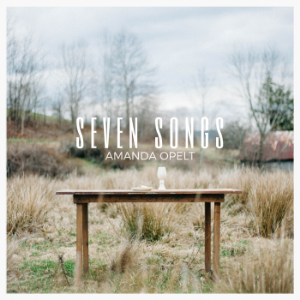
Working for a disaster relief organization doesn't always allow a lot of free head space for being artistically productive, but I had a supportive and creative community around me to encourage me, along with a sister who has always been my biggest cheerleader. After the songs were mostly complete, I had to decide how I was going to get them out there—if I was going to call up some of my contacts in Nashville and connect with a seasoned producer and engineer there, or try to find a way to complete the project here in Boone. The more I listened, the more I felt like this new home we've made up here in the mountains was reverberating through every line of every song. It felt unfaithful in some ways to take it off the mountain and away from the community of musicians and friends whose influence were part of the reason many of the songs even existed.
Our experiences are linked to people and places, specifics spots of earth that we inhabit in community together. Everything about our world today seems hell bent on pulling us away from fully occupying the time and space God has, in His wisdom, confined us to. The internet gives us access to images, ideas, art, and people from all over the world. We are more mobile than ever; recent studies estimate the average American can expect to move 11.7 times in their life. And in many ways, that's an enormous privilege and blessing.
But lately, I've wondered what that mobility and access to global goods for unlimited consumption has done to our ability to invest in our actual spatial communities and grow roots in a place. This thinking has led me to become a huge advocate of supporting the local arts. Not just supporting artist, but also encouraging people to become artists for their own communities.
In his novel Blackbeard, Kurt Vonnegut writes about how back in the old days (before advances in transportation, trade, communication), there would be one artist or one songwriter or one storyteller in a village of, say, 1,000 people. And that one artist was loved and supported and needed by that whole community. His or her art was unique to that distinct population, and could tell that one community's particular, specific story. And while that artist may not have been a prodigy or genius, he added value and was valued by the community. Vonnegut writes:
“...Simply moderate giftedness has been made worthless by the printing press and radio and television and satellites and all that. A moderately gifted person who would have been a community treasure a thousand years ago has to give up, has to go into some other line of work, since modern communications put him or her into daily competition with nothing but world's champions.... A moderately gifted person has to keep his or her gifts all bottled up until, in a manner of speaking, he or she gets drunk at a wedding and tap-dances on the coffee table like Fred Astaire or Ginger Rogers. We have a name for him or her. We call him or her an ‘exhibitionist.’ How do we reward such an exhibitionist? We say to him or her the next morning, ‘Wow! Were you ever drunk last night!’
And Vonnegut wrote that before the internet.
As a modern-day songwriter, I compete with the best and brightest from all over the world. As listeners, you have access to anybody and anything you want to listen to. And that's good! Access to such wonderful ideas has provided a rich quality of life. But in some ways, we can become art and information gluttons. Our brains and bellies are about to burst. The desire for more and faster and better is insatiable; the options are infinite in number and quality.

I'm encouraged by the "eat local" movement. Some studies show that our stomachs weren't actually designed to be able to digest such an endless variety of foods at all times. Thanks to globalization, we now have access to fruits and veggies from all parts of the world during all seasons ANY time we want. I wonder if the same may be true for the arts. While I wouldn’t advocate strict restrictions on what art people consume, I just wonder if there is something about local art, created in our own communities that especially resonates with and soothes the mind and soul in a way that other communities' arts can't.
I don't think that means we only release our art to our close family and friends, or only consume local art. I'm grateful that there are people in other parts of the world who have enjoyed (and bought!) my music. I guess what I'm saying is: I don't want the global competition to intimidate me or make me reticent. I don't want to feel like I have to be as good as the next genius coming out of New York or LA to feel like I'm adding value to the world and my community by sharing my art (and I don't want to be seen as the drunk exhibitionist Vonnegut writes about!).
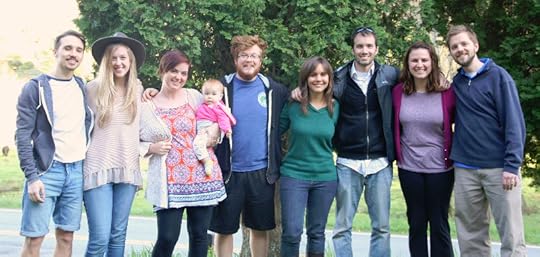
Learn about the community that produced Seven Songs here.
Furthermore, when we support and spur one another on as a community of artist, we transcend art for the sake of art, and start tapping into good ole' biblical edification. Deciding to produce and record this project here in Boone with the talented musicians here allowed for a much more organic process, and led to beautiful late-night discussions about what God had been teaching us. There’s something really special about recording and producing an album about the seven sacraments with people with whom you actually partake of those sacraments. I regularly attend Sunday worship and take communion alongside Glenn Deuel, who produced the album. His wife Erin, who assisted in production, sang background vocals, and did all the art for the album is the worship leader at our church. She and I have labored together for years now as leaders and musicians in our church community, and we regularly commission one another to serve in strength and confidence. Everett Hardin played cello and mastered the album, and the smiles of his wife and new baby fueled us on to the end of the project. These are the people who lay hands on me and pray when I am sick. I am married to the piano player. I've broken bread with these friends on numerous occasions. We've confessed our sins and weaknesses to each other. And they know that some of the sounds on this album sound like winter in Boone and feel like the water and wind rushing off these mountains. To me the album is valuable because I grew closer to my community and to my own spot of earth while creating it.
The years prior to moving to Boone had been difficult ones from us; everything from ministry burnout, to artistic frustration, church struggles, health issues and relationship challenges. Our time in Boone has been incredibly restorative for us. I think the theme of the album is death— the slow death of our old selves and agendas, expectations and sin natures, followed by the new resurrection life that comes with following Christ to the cross. I wanted to honor the people and place that have participated in that death and resurrection process with me. And I'm happy there are people in other communities that can listen to those stories and enjoy. But I want to encourage my fellow songwriters out there to write purposefully for yourself and for your own community. Don't let fear of the global competition or your own demands for perfection intimidate you into silence. There are countless songs yet to be written and consumed, even if those songs are just consumed at the local level. Or even if it's just your own spirit's cry to the Holy Spirit, a sacrament of song, and an audience of One. This too is grace and beauty.
***
You can get Seven Songs on iTunes or Amazon. Lean more about the community that produced Seven Songs here, about Amanda's church here, and about beautiful Boone here.



May 16, 2015
Sunday Superlatives 5/16/15
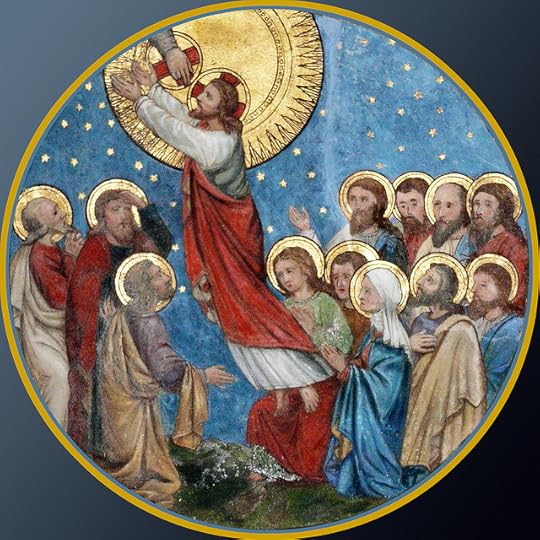
© 2011 Waiting For The Word, Flickr | CC-BY | via WylioAround the Blogosphere...
Best Interview:
In one of the greatest mashups ever, Krista Tippet interviews Maria Popova for On Being
“I think a lot about this relationship between cynicism and hope. And critical thinking without hope is cynicism. But hope without critical thinking is naïveté. And I I try to live in this place between the two to try to build a life there because finding fault and feeling hopeless about improving our situation produces resignation of which cynicism is a symptom and against which it is the sort of futile self-protection mechanism.”
Best Analysis:
Peter Enns with “11 Recurring Mistakes in the Debate Over the Historical Adam”
“No responsible doctrine of inspiration can deny that the biblical authors were thoroughly encultured, ancient people, who spoke as ancient people. Inspiration does not cancel out their ‘historical particularity,’ no matter how inconvenient. Any notion of inspiration must embrace and engage the notion that God, by his Spirit, speaks within ancient categories.”
Best Response:
Eliel Cruz at RNS with “Trans media has thrown Christians for a loop”
“Using archaic, demonizing language towards God-created individuals like Bruce Jenner isn’t representative of Christ. Speaking out of ignorance does damage. It only adds to the dehumanizing narrative that leads to trans people dying at a depressing rate.”
In related news, I had the chance to hang out with Eliel Cruz right here in DAYTON, TENNSEE! He happened to be in the area just in time for our big Strawberry Festival, so I made him take this picture of us in front of a bunch of tractors…for, you know, local color. Talking with Eliel over lunch I was so impressed by his passion, smarts, and commitment to the church. I was also a bit flummoxed by his youth. People in their twenties should NOT be this wise! Hope our paths cross again soon.
Had so much fun hanging with @rachelheldevans this afternoon ❤️ pic.twitter.com/bd4WMq5Vpe
— ELIEL CRUZ (@elielcruz) May 8, 2015
Most Powerful:
Elizabeth Corey and Mary Campbell at The Atlantic with “Two Sisters, Two Views on Gay Marriage”
“Mary and I live in a pluralist age when people of goodwill often hold radically different views. This calls, I think, for tolerance of the old-fashioned kind, not persecution of those who differ. It calls for patience and perhaps even persuasion, But the persuasion I have in mind is a humble kind of dialogue that approaches others with dignity and entertains the possibility that they, not I, have a greater purchase on the truth. Often, neither side can be persuaded, and so the differences persist. If this is the case, then tolerance calls for civility despite differences. At root, I believe it calls for love.”
Most Moving:
Seyward Darby at The Washington Post with “I was on Amtrak train 188. Afterward, I saw the crash through my fiance’s eyes.”
“The fear of loss, that someone can be snapped out of existence at any second, comes from the same deep, emotional well as love. Maybe it is love’s dark twin. It’s incredibly powerful — strong enough to poison your thinking to assume the worst will happen, in even the most mundane situations. I know it will now be our struggle together to not let that happen, to cope, to always find joy. But as with everything, perhaps we will be stronger together in this fight than I ever was alone.”
Most Helpful:
NPR with “People Have Misconceptions About Miscarriage, and That Hurts”
Most Encouraging:
Elizabeth Gilbert on Facebook on the elusiveness of perfection
Most Informative:
Eboni Marshall Turman at Duke Magazine with “She Who Sets the Son Free: Black Womanist Resistance in Context”
“In many ways, this is the scandal of black womanhood: their flesh-and-blood reality as both black and woman positions them to identify the contradictions of one-sided justice-making—or, we might say, to call everyone’s bluff.”
Most Insightful:
Nate Pyle with “Persecution or Clanging Cymbal?”
"It’s much easier to cry persecution than it is to confess sin. It’s easier to blame others than to accept responsibility. And when you claim to have the truth, as Christians rightly do, it’s hard to admit you’ve been in the wrong. But that’s exactly what we as a people who preach the importance of confession may need to do. It may be time to confess that we haven’t loved others well. We may need to confess that we have been more interested in being right than doing right. Let’s be clear, we do not need to apologize for being Christian, or having beliefs, or even for our beliefs. But we may need to apologize for the way we have approached and interacted with the world around us.”
Most Likely to Make You Ugly Cry:
Glennon Melton with “To mama, who taught me the most important thing”
“Were you afraid, for a moment on the plane that day, that you’d been so busy loving your people that you forgot to do something important? Because what I’ve learned from you is that there isn’t a damn thing more important than loving your people.”On the Blog...
Most Popular Post:
How to be a Christian on the Internet: 6 Questions and a New Series
From the Archives:
From the Lectionary: An Open Letter to Jesus on this Whole Ascension Business
I offered something of a confession over on Facebook on Friday - about how fear has often influenced my drive to be right about all the things - and a couple of the top comments were especially fantastic.
Don't forget...Like your piña colada with a side of religious crisis? Don't forget to pick up Searching for Sunday as a summer read!
No other way I'd like to start off my summer than with #SearchingForSunday and #Chacos pic.twitter.com/VOY3MDJPOu
— Mina Haddad (@misdaMINAa) May 3, 2015
A photo posted by Benjamin Harkins (@benjamin_harkins) on Apr 27, 2015 at 12:37pm PDT
Started #SearchingForSunday last night over an oldfashioned. 40 pgs in & it's hitting home so hard. @rachelheldevans pic.twitter.com/kR2ys5kuQG
— alissa k doyle (@lightswillguide) April 23, 2015
A photo posted by Abigail Dixon (@abigailelizabethsworld) on Apr 28, 2015 at 9:40am PDT
A good way to spend a few minutes of down time at the beach. #searchingforsunday #kindle
A photo posted by Paul Canady (@paulcanady) on Apr 25, 2015 at 8:38am PDT
***
So, what caught your eye online this week? What’s happening on your blog?



May 11, 2015
How to be a Christian on the Internet: 6 Questions and a New Series

© 2009 webtreats, Flickr | CC-BY | via Wylio
My favorite blog posts are the ones that begin with a question to which I don’t know the answer, and this is especially true for a new series I’m pleased to announce today: “How to be a Christian on the Internet.”
Now, I realize I could just as easily call it “How to be Decent to One Another on the Internet” or “How to be Human on the Internet,” but given this particular community of readers, I wanted to frame the discussion around specifically Christian values and concerns, (many of which also apply to those of other religious persuasions, of course). And I wanted to introduce the topic through a series of questions, precisely because questions are about as far as I can go with this topic without tripping up on my own failed attempts to establish guiding principles or rules about how to engage other people with wisdom, conviction, and grace online.
So over the next four months of summer, I’ll be posing the following six prompts to some of the wisest and kindest people I know and sharing their responses in a series of roundtable discussions. We’ll interview researchers, psychologists, bloggers, journalists, clergy, authors, activists, artists, leaders, and all sorts of other people. We'll look at the latest research, consider the relevant philosophical/theological issues at hand, and discuss best practices. There’s no set schedule. I’ll just post each roundtable discussion when it’s ready.
Here are the six prompts:
1. Call-Outs
Both Scripture and Christian tradition remind us that faithful prophetic protest is crucial to confronting injustice, speaking truth to power, and advocating for and standing with the marginalized. Social media has provided a powerful tool for doing just that. Just look at the role it has played in organizing and reporting on the Ferguson and Baltimore protests, in challenging the teachings and behaviors of authoritarian religious leaders, and in amplifying voices that have traditionally been sidelined (like those of women and LGBT Christians). But along with the call to prophetic witness we must also consider biblical admonitions to “speak the truth in love,” to “be kind to one another, tenderhearted, forgiving one another,” and to “do justice, love mercy, and walk humbly with God.” So what’s the difference between being prophetic and just being a jerk? How do we advocate both prophetic challenge and grace-filled public engagement without resorting to incivility on the one hand or tone-policing on the other? Is an online “call out” an effective way to create change, and if so, how can it be done well?
2. CommunityI often refer to the readers of this blog as a community, and indeed it often feels like one. We share stories, engage in debate, confess our deepest fears and failures, help one another out, teach and learn, laugh and cry. But in the last year or so I’ve also grown more aware of the limits of such a community, especially when the mental and emotional energy required to maintain online relationships detracts from those longtime, flesh-and-blood relationships with family, friends, and church. To what extent is an online gathering a community? What does it look like to have a healthy regard for such communities, including both their possibilities and their limitations?
3. “Twitter Fight!”
Very rarely have I been in a conversation with someone who, when presented with new evidence or a strong argument, immediately changed their mind….and yet I seem to expect this to happen in 120 characters on Twitter! (Or with a distant relative on Facebook.) Often we take to social media to debate theology, politics, and culture, and yet because the forum removes important conversation cues like vocal tone, body language, and established relationship, these debates tend to only further entrench existing views. Is it even possible for online debates to be productive? If so, what principles should we apply for effectively and persuasively engaging one another in that space?
4. Boundaries & BalanceFrom writers who are creatively exhausted from managing a constant stream of online feedback, to readers who can’t seem to pull themselves away from their smartphones, to activists who are burned out from responding to yet another crisis with a social media campaign, to foodies who can’t enjoy a meal without snapping a photo for Instagram, our writing, reading, and sharing habits consume more of our time and mental energy than ever. Yet few of us have the option or desire to completely unplug when our technology also has the power to connect, encourage, and challenge us in some really beautiful ways. So how do we find a balance? How do we protect our “real life” from getting eaten up by our “virtual life”? (Or is such a distinction unhelpful?) What are some general principles and practical ideas for drawing healthy boundaries around the time we spend, relationships we nurture, and the work we do online? And what does it mean to mark the Sabbath in our hyper-connected, plugged-in culture?
5. ShamingIt seems like everyone’s talking about shame these days. From Jon Ronson’s popular book, So You’ve Been Publicly Shamed, to Monica Lewinsky’s now-viral TED talk, “The Price of Shame,” to Brené Brown's much-discussed research, to articles in Christianity Today, The New York Times, BuzzFeed, and more, our collective conscience appears to be a bit bothered about the way transgressors (or perceived transgressors) are punished in the media these days. And yet this aversion to public shaming is coupled with a desire for justice, particularly when the transgressor (or perceived transgressor) is a person of power. Is it right to categorize shame as either all-good or all-bad? Is shaming ever an effective way to inspire change? Given the centrality of grace in the Christian life, how should Christians respond to those who have been publicly disgraced, and how to we avoid appealing to grace as a way of letting abusive or dangerous people off the hook?
6. CriticismWe are often told, “don’t feed the trolls!” but it’s important to keep in mind that not all critics are trolls and not all disagreement is bullying. So how do we make those distinctions? How can we let the helpful critiques in while keeping the harmful critiques out? What sort of policies keep our online forums safe for productive conversation, and what sort of practices keep our hearts healthy for feedback?
***
If you have another pressing question that you would like to add to the prompts, leave it in the comment section and I’ll definitely consider it for a seventh installment. And if there is someone you would especially like to hear from, let me know.



May 8, 2015
Follow Friday: The Women of Why Christian?
Why, in the wake of centuries of corruption, hypocrisy, crusades and televangelists, do we continue to follow Jesus?
This was the question Nadia Bolz-Weber and I wanted to pose to ourselves and to eleven other women whose words and work remind us of why we’re Christians in the first place. If you’re interested in engaging these voices and adding your own, join us in Minneapolis, September 18-20 for the first-ever Why Christian? conference. (It’s NOT a women’s conference, by the way; it’s for everyone!) There are only a few spots left, and we’d love to see you there.
Today’s Follow Friday features the eleven women who will join Nadia and me as speakers, so you can start following them online now.
Winnie Varghese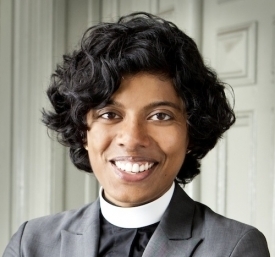
Winnie Varghese is the rector of St. Mark’s in-the-bowery (Episcopal), the oldest site of continues worship in New York and a congregation that has tripled in size since she arrived six years ago.
“St. Mark’s is a church that looks like the city,” she says. “Our folks don’t mind if someone who lives in a group home goes traipsing through the service with 25 keys around their neck. People come off the street, they come in from Wall Street wearing blazers, we have artists and writers and teachers.”
A graduate of Union Theological Seminary who served as a chaplain at both UCLA and Columbia University, Winnie’s approach to justice and Jesus-following is hands-on, practical, and refreshingly straightforward. “People seem to think that if they can out-argue their Facebook buddy, then it has something to do with a guy sitting on a bench outside of St. Mark’s,” she says. “And it doesn’t…The idea of the story of the life of Jesus really works for me. The idea that there are riches in that story to be plumbed for the rest of my life really works for me. That we would try to organize communities around that really works for me.”
Check out Winnie’s columns for The Huffington Post.
Follow Winnie on Twitter.
Read this great feature on Winnie’s ministry from The Daily Beast.
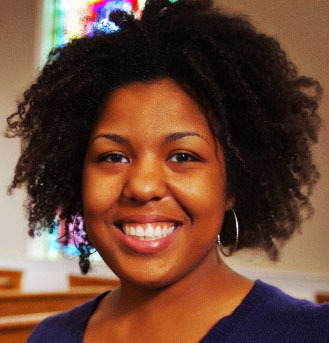
Tiffany Thomas is the twenty-nine-year-old pastor of South Tyron Community Mission Church in Charlotte, North Carolina (United Methodist Church). She answered her call to ministry at the age of 15, and has been preaching, teaching and pastoring in the local church ever since.
A graduate of Spelman College and Duke Divinity school, she molds her life after the strong belief that we are called to be agents of social and spiritual change. To get a sense of Tiffany’s point-of-view, check out one of the first entries in her blog, “Shouting From the Front: Reflections of a Disorderly Woman Pastor.”
Read Tiffany’s blog.
Follow Tiffany on Twitter.
Check out this video from the UMC featuring Tiffany’s work.
Nichole Flores
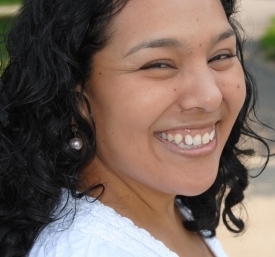
Nichole Flores is a college theology professor, writer, and public theologian. As a Roman Catholic and Latina, Nichole equips Christians and the broader public with a deeper understanding of the gifts, perspectives, and concerns of the burgeoning Latina and Latino population in the United States.
Flores is a blogger for Catholic Moral Theology and Millennial Journal and a North American contributor to the Catholic Theological Ethics in the World Church Forum. She teaches theology at Saint Anselm College and is a Ph.D. candidate at Boston College having earned a M.Div. from Yale Divinity School.
Check out Nichole’s Web site.
Follow Nichole on Twitter.
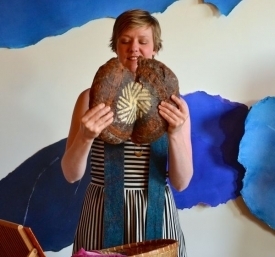
Emily Scott is the pastor of St. Lydia’s, a dinner church in Brooklyn, New York, associated with the Evangelical Lutheran Church in America. (This is the dinner church I feature in Searching for Sunday.) Each week, the community gathers to cook and share a sacred meal, just as the first followers of Jesus did. “We do church this way because people are hungry,” explains Emily. “People in New York have hungry bellies that may be filled with home-cooked food. They have hungry souls that may be filled with holy text, holy conversation. And these hungers are sated when we come together and eat.”
Trained as a liturgist and musician at Yale Divinity School and the Institute of Sacred Music, Emily has followed a particular interest in the intersection of worship and the arts.
Check out St. Lydia’s awesome interactive Web site.
Follow St. Lydia’s on Twitter.
Watch this video about St. Lydia’s.
Jes Kast-Keat
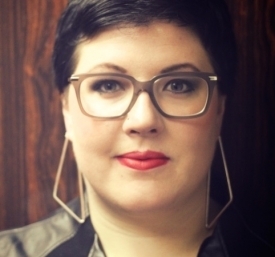
Jes Kast-Keat serves as Associate Minister at West End Collegiate Church in NYC (Reformed Church in America), and is an all-around delightful human being who brings humor, sass, and wisdom to her ministry and to her friendships. (I seriously love hanging out with this lady!)
Jes is the President of the Room for All Board of Directors, which is working for LGBTQ inclusion in the the RCA. She writes for Think Christian, and as you may recall, was our guest for "Ask a Reformed Pastor…”
Check out Jes’ Web site.
Follow Jes on Twitter
Listen to Jes’ thoughts on prayer in this Thirty Seconds or Less clip.
Austin Channing Brown

Austin Channing Brown is one of my very favorite bloggers, whose journey as an evangelical racial reconciler began in college with an experience called Sankofa–a three-day bus trip exploring Civil Rights sites throughout the South.
Since then, she has earned a Masters in Social Justice and directed a short-term missions site on the west-side of Chicago, where she created interactive opportunities for young people to engage issues of poverty, injustice, and race. She also worked with two Willow Creek Community Church campuses, developing strategies and programming around multiculturalism. She currently serves as a Resident Director and Multicultural Liaison for Calvin College. Austin served as our guest for “Ask a Racial Reconciler…”
BE SURE to subscribe to Austin’s blog.
Follow Austin on Twitter.
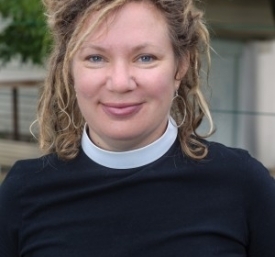
Jodi Houge was a student at Luther Seminary when she invited people to gather for worship in a neighborhood coffee shop. That was how Humble Walk (ELCA) was born. Six years and six locations later, Jodi is still running to catch up with where this church of artists, musicians, cooks, questioners, farmers, and learners is leading her.
Jodi lives in St Paul, MN with her musician/baker husband and two daughters.
Check out Humble Walk Church.
Follow Jodi on Twitter.

Rachel Murr was passionate about her faith and active in her church when “after nine years of trying not to be gay,” she finally came out to her community. “The pastors debated for months about whether I should be allowed to stay in leadership,” she recalls. “The conflict that ensued made me wonder if my church was good for me anymore. I wanted to stay, but I feared it would only hurt.”
The experience led Rachel—a therapist from St. Paul, Minnesota—to research how other queer women from non-affirming Christian communities have related to the church and how they’ve maintained their faith. Her book, Unnatural: Spiritual Resiliency in Queer Christian Women, is a compilation of research, interviews, and memoir that explores the experiences of women who have fought to hold on to their faith in spite of obstacles related to gender and sexuality.
Check out Rachel’s book.
Follow Rachel on Twitter.
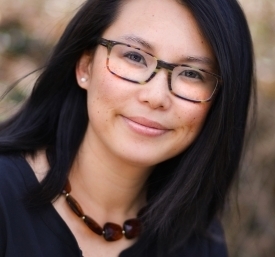
Mihee Kim-Kort is an ordained Presbyterian (PCUSA) minister, mother of three, and prolific writer, whose books include Making Paper Cranes, Streams Run Uphill, and Yoked (a book co-authored with her husband about being a clergy couple).
Born in Seoul, Korea, she and her parents immigrated here shortly after her birth. Settling in Colorado, she was baptized in a Methodist church before her family joined the local Korean Presbyterian (PCUSA) church. It was here that she learned the faith. During her undergraduate studies at the University of Colorado in Boulder, she joined various Christian fellowship groups and majored in Religious Studies and English Literature. It was during this time, and then at Princeton Theological Seminary, that she began to experience a shift from traditional evangelicalism to a more inclusive faith focused on God’s Good News in the here and now. Her writing reflects this on-going process of making her faith palatable, relevant, and authentic.
Check out Mihee’s Web site and blog.
Follow Mihee on Twitter.
Read Mihee’s contributions to Deeper Story
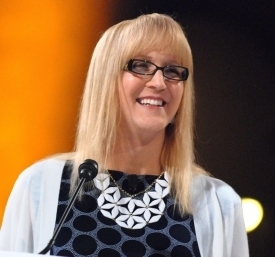
Allyson Dylan Robinson is an entrepreneur and movement strategist who advises organizations on the vanguard of social change. In 2014 she became transitional pastor of Washington, D.C.’s Calvary Baptist Church, an ecumenical, multi-racial, multi-generational congregation that has served the nation’s capital for over 150 years. She is believed to be the first openly transgender person ever to be ordained by a Baptist church – a distinction that led MSNBC to speculate she might be “the most radical preacher in America.”
She’s also served as an Army officer and nonprofit CEO, studied at West Point, Embry-Riddle Aeronautical University, Arizona State, and Oxford University, and earned degrees in physics and theology.
Check out Allyson’s Web site.
Follow Allyson on Twitter.
Watch Allyson speak at the Reformation Project conference in Washington, D.C.
Kerlin Richter

Kerlin Richter is the founding priest of Bushwick Abbey, a new creative Episcopal Church in Brooklyn, NY. She is the former editor of Hip Mama, the parenting zine. Additionally, Kerlin has been a painter, a writer, a teacher, a waitress, a librarian, a personal assistant, a tax preparer, an ice-cream scooper, an art restorer, a barista, a nanny, an accounts receivable clerk, a potter, an art supply seller, a dishwasher, and a graphic designer. Havings hared a beer with her, I would also add that Kerlin is what we southerners like to call A HOOT.
According to the Web site, Bushwick Abbey is “unapologetically Christian, which means that we believe we stand on holy ground when we meet you where you are. We are persuaded, that neither death, nor life, nor angels, nor principalities, nor powers, nor things present, nor things to come, nor height, nor depth, nor any other creature, shall be able to separate us from the love of God, which is in Christ Jesus our Lord. We welcome the whole of you with the whole of us.”
Check out the Bushwick Abbey Web site.
Follow Kerlin on Twitter.
Read this article about the “blue-haired Episcopal priest blessing animals in Bushwick park.”
***
Of course, you should also be follow my dear friend Nadia Bolz Weber, if you aren’t already familiar with her. And be sure to join us in September for Why Christian?
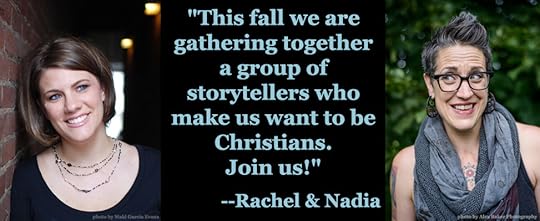



May 7, 2015
7 Ways to Welcome Young People to the Mainline
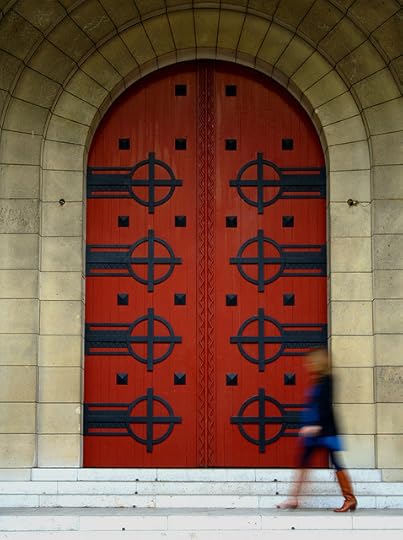
© 2009 Marc Kjerland, Flickr | CC-BY-SA | via Wylio
It’s been such a thrill to see my Washington Post op-ed, “Want millennials back in the pews? Stop trying to make church ‘cool’” generate so much conversation over the last few days. Thanks for sharing it so widely! One common and helpful pushback to the article has been the question: “Well, if millennials in the U.S. are dissatisfied with highly-produced hip expressions of Christianity, why aren’t they flocking to the mainline?”
I’m as uncomfortable as many of you with claiming to speak on behalf of an entire generation or an entire denomination. That’s never been my aim. When it comes to talking about the future of faith, there are about a million angles to take, and most of mine have admittedly focused on specific questions facing (mostly) white Protestants in the U.S. and are therefore limited in scope. So, as always, take what I offer here with a grain of salt.
Still, given the fact that studies show continued decline in the U.S. mainline, I think the question is worth addressing, even from my own limited experience. My guess is that folks dissatisfied with highly-produced, hip expressions of Christianity also struggle with classic mainline liberalism as their only alternative. With all of this in mind, and in response to common questions I receive when speaking at mainline churches, I’ve dusted off and updated this older post from 2013 with seven ways to welcome young people to the mainline:
1. Update your Web site.
While millennials aren’t necessarily looking for a highly-produced show or the latest and greatest technology, they are often looking for your address. And maybe a belief statement of some sort. Young adults tend to start their search for anything—be it a church or an apartment or even a date— on the Internet, so if your site is difficult to navigate and embarrassingly out-of-date, they may not bother to come for a visit. I also appreciate it when a church’s Web site includes information about beliefs, ministries, worship, ministerial staff, educational programs, etc. And if your church is located in a more conservative area (say, East Tennessee), you might even want to make special note of the fact that you welcome LGBT people and affirm women in ministry. Just keep in mind that often our first "visit" to your church is via the Web site. So it might be worth putting some extra time and resources into it.
2. Take risks on unconventional church plants.In Searching for Sunday I feature several unusual church plants that are thriving in their communities, and many are associated with mainline Protestant denominations that were willing to take a risk on unconventional models. One such church is St. Lydia’s in Brooklyn—a small “dinner church” centered around the Eucharist as both a sacred ritual and a meal. (St. Lydia's is associated with the Evangelical Lutheran Church of America.) Another church that comes to mind is Missiongathering in San Diego, which is associated with the progressive denomination The Christian Church (Disciples of Christ), but which has a very evangelical “feel” to its worship because it attracts a lot of folks who come from evangelical traditions and enjoy evangelical worship but are looking for a church that welcomes LGBT people. I think too of Nadia Bolz-Weber’s House for All Sinners and Saints in Denver, also associated with the ELCA, or Bushwick Abbey and Thad’s Episcopal Community, both associated with the Episcopal Church.
I’m no expert on church planting, but what these churches seem to have in common are pastors and laypeople who share a vision for ministering in a unique way to a specific group of people in a specific neighborhood, partnering with a denomination that can help with resources and accountability. These days, it’s less about getting people to come to you and more about going out, serving the people, and then letting them build the church together.
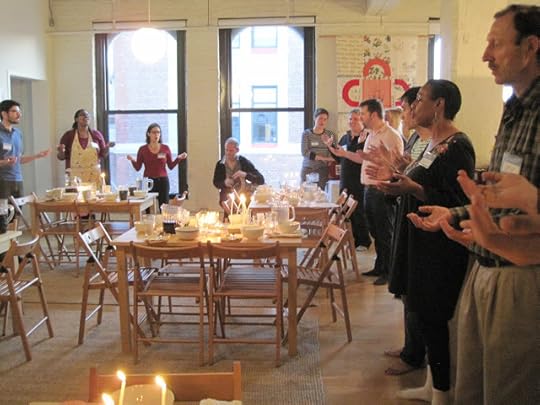
St. Lydia's, Brooklyn
3. Infuse the traditional liturgy and sacraments with some creativity.
A lot of young, disenfranchised evangelicals like me are drawn to the beautiful and ancient liturgy of more traditional churches. For us, it’s a refreshing alternative to the highly-produced contemporary worship services we’ve grown used to (conversely, folks who grew up with more traditional worship may love the contemporary worship of an evangelical church; with church, we often crave what we feel like we’ve been missing). So you don’t have to replace your smells and bells with electric guitars to welcome young disenfranchised evangelicals. But it’s nice to see a little creativity infused into the liturgy.
House for All Sinners and Saints seems to do this beautifully. On their Web site, they explain:
“We follow the ancient liturgy of the church (chanting the Kyrie, readings from scripture, chanting the Psalm, sermon, prayers of the people, Eucharist, benediction, etc.) We also sing the old hymns of the church. So there's lots of ancient tradition at HFASS, but there's also some innovation. We always include poetry and a time called ‘Open Space’ in which we slow down for prayer and other opportunities to actively engage the Gospel; writing in the community's Book of Thanks, writing prayers, making art or assembling bleach kits for the needle exchange in Denver. We like to say that we are ‘anti-excellence/pro-participation’, meaning that the liturgy is led by the people who show up…”
St. Gregory of Nyssa Episcopal Church in San Francisco also takes a creative approach to their traditional liturgy. Check out the worship section of their Web site.
You don’t have to make any radical changes all at once, or go as far as HFASS and Gregory of Nyssa, but doing things differently now and then enriches the inherent beauty of the liturgy and reminds both longtime members and newbies why it's so central and so important to the life of your church.
It may also be helpful to take cues from evangelical groups that are actively recovering more traditional, liturgical worship and practice in their communities. Check out Aaron Niequist's work with The Practice, for example.
4. Relax a little.I know this may not reflect national trends, but the Episcopal Church Dan and I attend—St. Luke’s in Cleveland, Tennessee—is incredibly diverse as far as the ages of people sitting in the pews. We have retirees sitting next to hipsters sitting next to moms bouncing toddlers on their laps sitting next to middle-aged professionals. In the parking lot you’ll spot as many Romney/Ryan bumper stickers as Obama/Biden ones, and theological views are pretty diverse too.
There are many reasons for this of course (see points 5-7), but one is that even amidst the traditional worship and liturgy, St. Luke’s has a relaxed atmosphere. The church is located in a conservative part of the country (in a town that serves as the national headquarters for the Church of God and home to one of the largest Pentecostal universities in the country), so it attracts a lot of people who grew up Southern Baptist or Pentecostal or non-denominational. The rector was raised Southern Baptist and the worship leader Pentecostal, so both speak fluent evangelical. While there is great respect for the traditional liturgy and worship of the Episcopal Church, the place is totally devoid of the stuffiness and stiffness you encounter in some more traditional churches whose favorite refrain seems to be, “we’ve always done it this way” with a subtle undertone of “please don’t break anything.” At St. Luke’s, no one’s going to look down their nose at me if I wear jeans one Sunday, and no one’s going to freak out if a little kid shouts, “NEXT COMES THE BLOOD!” while taking communion (this actually happened, to a chorus of chuckles). Everyone is laughs easily, lets the small stuff slide, and from time to time offers helpful reminders like “the red book is the Book of Common Prayer and the blue book is the hymnal.”
5. Don’t assume we know why you believe what you believe, or why you do what you do.The other day I had a conversation with a young woman who grew up Methodist. She explained to me that when she went to college and began attending a conservative complementarian church with her friends, she felt ill-prepared to explain why she supported women in ministry. “They had all the Bible verses,” she said. “And I had no idea how to respond to them. I guess growing up Methodist I’d always taken women pastors for granted.” She grew up knowing her church affirmed women in ministry, but she never learned why her church affirmed women in ministry.
I also hear from a lot of evangelicals who have begun attending Mainline Protestant churches precisely because they welcome LGBT people, accept scientific findings regarding climate change and evolution, practice traditional worship, preach from the lectionary, affirm women in ministry, etc., but these new attendees never hear the leadership of the church explain why this is the case. This need not happen from the pulpit, but perhaps a Sunday school class or Bible study addressing these issues would be helpful, not only for those new to the church but also for those who grew up in the tradition and need a refresher.
Our church holds “Episcopal 101” classes that serve as both an introduction to Anglican theology and practice and also as a confirmation classes. We were unable to attend due to travel, but two of our friends did, and they were confirmed last spring. They said some in the class were longtime Episcopalians there for a refresher while others were disenfranchised evangelicals just learning the ropes.
6. Challenge us.Perhaps the most annoying assumption mainline church leaders seem to make about millennials is that we require a dumbed-down, inoffensive, and unobtrusive faith. As happy as I am about shorter sermons on Sunday mornings that pull the attention away from the pastor and onto the Table, I still long for the intense Bible study and training so common in the evangelical churches I’ve loved. St. Luke’s offers this through those Episcopal 101 classes I referenced earlier as well as challenging Sunday school offerings. (We have one right now on world religions that is incredibly comprehensive.) The church also partners with a local rabbi from time to time for conversation around Hebrew Scripture and offers a variety of Bible study/book club options.
Sometimes I get the idea that folks in the mainline are so frustrated with how evangelicals have wielded the Bible and faith in the public square, they avoid language, practices, and teaching that might be construed as overly religious, overly biblical, or overly exclusive. To them I want to plead: Please, please don’t be afraid of being distinctly and unapologetically Christian! Don’t be afraid of pushing and challenging us!
I once spoke with a young woman who was raised in a very liberal mainline tradition who told me she left the church because, “I wasn’t learning anything there about tolerance, love, and good stewardship of the planet that I wasn’t learning at my public high school, so what was the point?” As passionate as young Christians are about social issues, we realize that both Jesus without social justice and social justice without Jesus leaves something to be desired.
If you don’t like how conservative evangelicals talk about the Bible, then talk about it better, but don’t not talk about it at all. If you don’t like how conservative evangelicals proselytize, then preach the gospel better, but don’t not preach it at all.
7. Help us build lasting relationships.I’m not sure why this is, but it seems like Mainline Protestant churches are less likely to have “small groups” where members gather together in one another’s homes to simply share life together. (If I’m making an unfair assumption or generalization, let me know.) Obviously, such groups can be less-than-helpful when they divide everyone up by age group and marital status, but I’ve also seen them represent what is most powerful about church as members become deeply invested in one another’s lives. Weekday Bible studies can also serve this purpose, or perhaps even certain Sunday school gatherings. I’m convinced that one thing folks from my generation long for is the chance to talk openly and honestly about our faith, our doubts, our questions, our ideas, our struggles, our joys, etc. in the context of a faith community.
***
What else? How can progressive Mainline Protestant churches welcome young people and disenfranchised evangelicals?
For my own church story, coupled with reflections on the sacraments, check out Searching For Sunday: Loving, Leaving, and Finding the Church.



May 2, 2015
Searching for Sunday Excerpt: “Breath”

© 2007 Alfred Payne, Flickr | CC-BY-SA | via Wylio
My friend Shauna Niequist is as generous with her platform as she is with her heart and home, and this week she was kind enough to post an excerpt from Searching For Sunday from the chapter entitled “Breath” :
"The Spirit is like breath, as close as the lungs, the chest, the lips, the fogged canvas where little fingers draw hearts, the tide that rises and falls twenty-three thousand times a day in a rhythm so intimate we forget to notice until it enervates or until a supine yogi says pay attention and its fragile power awes again. Inhale. Exhale. Expand. Release. In the beginning, God breathed. And the dust breathed back enough oxygen, water, and carbon dioxide to make an atmosphere, to make a man. Job knew life as “the breath of God in my nostrils,” given and taken away. With breath, the Creator kindled the stars, parted a sea, woke a valley of dry bones, inspired a sacred text. So, too, the Spirit, inhaled and exhaled in a million quotidian ways, animates, revives, nourishes, sustains, speaks. It is as near as the nose and as everywhere as the air, so pay attention.
The Spirit is like fire, deceptively polite in its dance atop the wax and wick of our church candles, but wild and mercurial as a storm when unleashed. Fire holds no single shape, no single form. It can roar through a forest or fulminate in a cannon. It can glow in hot coals or flit about in embers. But it cannot be held. The living know it indirectly—through heat, through light, through tendrils of smoke snaking through the sky, through the scent of burning wood, through the itch of ash in the eye. Fire consumes. It creates in its destroying and destroys in its creating. The furnace that smelts the ore drives off slag, and the flame that refines the metal purifies the gold. The fire that torches a centuries-old tree can crack open her cones and spill out their seeds. When God led his people through the wilderness, the Spirit blazed in a fire that rested over the tabernacle each night. And when God made the church, the Spirit blazed in little fires that rested over his people’s heads. “Quench not the Spirit,” the apostle wrote. It is as necessary and as dangerous as fire, so stay alert; pay attention…
The Spirit is like a seal, an emblem bearing the family crest, a promise of belonging, protection, favor…"
Get your copy of Searching For Sunday
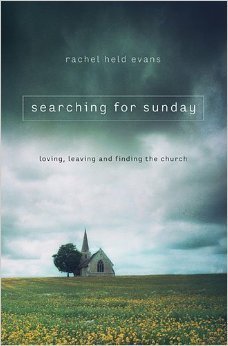



May 1, 2015
Why a Seminary Degree Doesn’t Have to Make You A Jerk
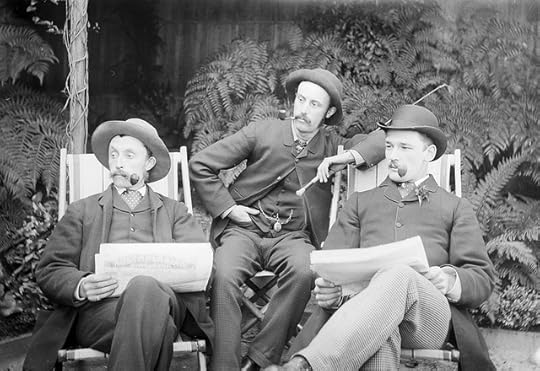
© 1910 State Library Victoria Collections, Flickr | CC-BY | via Wylio
Not too long ago, I was at a dinner party and was asked by the hostess if I’d been embroiled in any intense writing projects lately. (I suspect my slightly dazed, what-is-this-thing-called-sunshine? look was something of a giveaway.) I laughed and told the group about Searching for Sunday—perhaps the most challenging and rewarding creative project of my life—which at the time was a mere 10,000 words away from completion.
Barely had the familiar elevator pitch, “it’s a book about a doubter’s search for church, arranged around seven sacraments,” left my lips when a young, seminary-trained man at the table interrupted me and launched into a 15-minute lecture on sacramental theology, suggesting I google Alexander Schmemann (whose book, For the Life of the World, I’d already read three times) before “attempting a popular treatment” of the sacraments.
I received several apologetic glances from the hostess, who finally managed to wrangle the conversation away from the young Calvinist and turn it to the topic of asparagus, which, miraculously, he did not seem to have an opinion about. We never returned to the sacraments, whose beauty and power had been lighting up my imagination for the last fourteen months.
The truth is, my lack of seminary training is something I’m deeply insecure about. Every writer struggles with self-doubt, and the refrain most commonly caught in a loop in my brain is: Who do you think you are? What do you know about God or faith or church? You haven’t even been to seminary! What could you possibly teach anyone?
This insecurity gets reinforced by people like my dinner companion, who seem especially perturbed that an undereducated woman like me has built a platform from which to write and speak about faith.
Regardless of how well they know me or my work, these guys tend to approach our conversations with a paternalistic familiarity that makes me uncomfortable, immediately rendering me the student and them the teacher. I am not criticized; I am “lovingly corrected.” We do not discuss where we agree or disagree; I am informed of what I got right and what I got wrong. It’s not a peer-to-peer conversation; it’s a session of “pastoral counseling,” initiated by a man who is not, in fact, my pastor.
What they don’t realize, of course, is that I am intensely aware of my lack of theological qualifications, which is precisely why I read a lot, cite my sources, ask questions, listen, apologize when I get stuff wrong, and refuse to fake my way through Q&A sessions when the honest “A” is “I don’t know.” It’s also why I invite comments and critiques from faithful collaborators—pastors, scholars, artists, scientists, doctors, parents, blog commenters, and editors—who often know more about a given topic than I and whose insights improve my writing by miles. My gifts and training are in creative writing. My interests are in matters of faith. I know I am not entitled to respect, but on my better days, I am of the conviction that regular people can talk about God too, and perhaps even prophesy.
It would be easy to turn this post into a rant against the much-maligned phenomenon “mansplaining,” which is certainly real, though perhaps too liberally invoked on social media. What I’d rather do is tell you about the alternative, about just a few of the people who treat me and nearly everyone they encounter with respect, openness, and humble teachability, even as they carry around an armful of credentials.
A seminary degree doesn’t have to make you jerk. You can be an expert on ancient Hebrew without fancying yourself an expert on everything. In fact, the people who have taught me the most in life do not view themselves as teachers, but rather as perpetual students, always eager to learn more and always open to changing their minds.
Perhaps the closest example of this in my life is Dan, who is an insatiable and avid learner and who has as one of his life’s mottos, “always assume there’s someone in the room who knows more about the topic at hand than you do.” He says he learned much of this from his sister-in-law, Maki, who is smart, curious, entrepreneurial, and who will “listen your mouth off” if you let her. Like Maki, Dan responds with the delight of a child whenever he encounters some new and interesting idea, and like Maki, Dan is no respecter of persons when it comes to seeking out teachers—whether it’s the grocery bagger, a theoretical physicist, or an eleven-year-old nephew. Dan doesn’t have to prove himself an expert on everything because he's secure enough in what he knows and what he doesn’t know to engage other people as peers. As we were talking about this post today he said to me: “Tell them that if they’re in a conversation where they are the expert; they ought to change the subject. Because what fun is that?”
When it comes to matters of faith, my father is like this too—open, curious, and humble. As a kid I believed his degree from Dallas Seminary made him an all-knowing expert on Jesus and the Bible and I bragged to my friends that he was a “Master of Divinity.” But when my questions evolved into the kind without easy answers, Dad refused to respond with empty platitudes or weak apologetics, and instead simply took my hand, walked with me through all the pain and anger and fear that accompanies religious doubt, and said, “I don’t know, Rachel. Let’s find out together.”
I’ve been fortunate, too, to have pastors who respect the people in their congregations as peers rather than sheep in perpetual need of guidance. In Searching for Sunday, I write about Brian Ward, who even as a youth pastor at a church that forbade women from teaching and leading was the first to tell me I had gifts for teaching and leading. Just a few months ago, I met with the rector of our new church who, though he sat in an office lined with heavy commentaries and some of his own published work, said, “We’re so glad you’re a part of this community. You have so much to teach us!”
And then there are the people with whom I’ve had the pleasure to converse and collaborate as a result of my writing, people with big brains and fancy degrees who have every right to shrug off the musings of small-town author, but who instead engage me with enthusiasm, interest, and mutual respect…even if we don’t always agree and even if they offer useful, critical feedback.
Richard Beck is one such person. The man is one of the smartest, most well-read people I know, armed with a PhD in experimental psychology and years of researching and writing. But Richard is also one of the kindest, most encouraging people I know. He’s someone who engages in conversation in such a way that you walk away feeling both smarter and more confident, like you’ve both learned and contributed. Richard will recount with enthusiasm and specificity all the things he’s learned from me, from other bloggers, from his students, from his wife Jana, from the Bible study he leads with fifty inmates at a maximum security prison each week. The world is his lab and he’s a joyful, engaged observer, taking notes on it all.
The same could be said of credentialed people like Peter Enns, Scot McKnight, and Walter Brueggemann, who have graciously offered their encouragement and insight to me through the years, and of course to the many credentialed women—Nadia Bolz-Weber, Christena Cleveland, Lauren Winner—who have done the same.
Brueggemann recently displayed his trademark humility in acknowledging, “Until the middle of the twentieth century scripture study was essentially white males. And white males --including myself -- always walked under the flag of objectivity. 'We are objective scholars!' Now what we are discovering in the presence of many other voices is that what we thought was objectivity is simply white-male-experience."
Even Walter Brueggemann….WALTER BRUEGGEMANN, PEOPLE… knows he doesn’t know everything. Even Walter Brueggemann values the insights and perspectives of other people, especially those whose gender, race, or socioeconomic status means they see Scripture differently than he.
Whenever I catch myself looking down my nose at a first-time author with a new book or a blogger who has yet to learn the term “intersectionality,” I think about people like Walter B., my dad, Dan, Richard Beck, Maki and Nadia, people who aren’t so quick to let on how much they know, people who delight in learning from others, even from me. And I pray that I become more like them—curious, humble, awe-struck, and kind. I pray I grow secure enough to listen and learn as a student of the world.



Rachel Held Evans's Blog
- Rachel Held Evans's profile
- 1710 followers



